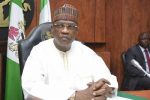Kachikwu’s Whistle By Ray Ekpu
The Minister of State for Petroleum Resources is Dr. Ibe Kachikwu. The Minister of Petroleum Resources is Alhaji Muhammadu Buhari. Buhari is also the President of Nigeria, while Kachikwu doubles as chairman of the Nigerian National Petroleum Corporation’s (NNPC) Board of Directors. NNPC manages Nigeria’s oil business. It collects all the money from the oil industry and brings to the table for sharing. The money it controls – in dollars – and the powers it wields – in political capital – are awesome. Whoever is the Minister of Petroleum Resources is the god of cash. Two of our Presidents, Olusegun Obasanjo and Muhammadu Buhari decided, as civilian presidents, that since the oil portfolio is very strategic they would run the ministry by themselves as the substantive minister. Whether or not that is the best decision for the country is not the subject of this piece. But I suspect that part of the reason that informed the decision may have been to ensure that decisions can be taken promptly when emergencies occur in this volatile industry that is warehoused in a volatile region, the Niger Delta region.
On August 30 this year the Minister of State, Kachikwu, wrote a letter to his direct boss and substantive Minister of Petroleum Resources and President of Nigeria, Buhari. He complained about the Group Managing Director of the NNPC, Dr. Maikanti Baru. He complained of Baru’s alleged insubordination to, the humiliation of him, breach of due process in the award of contracts totalling about $24 billion. He listed some of the contracts allegedly awarded without due process as (a) crude term contracts $10 billion (b) DSP contracts $5 billion (c) AKK pipeline contract $3 billion (d) various financing allocation funding contracts worth over $3 billion (e) NPDC production service contracts valued at between $3 billion and $4 billion. Kachikwu stated that the “legal and procedural requirements are that all contracts above $20 million would need to be reviewed and approved by the Board of NNPC. Over one year of Dr Baru’s tenure, no contract has been run through the Board.”
Dr. Baru has not yet responded to these allegations so at this point they remain mere allegations. The views expressed here are therefore tentative and on an iffy basis. By iffy basis, I mean that if Kachikwu’s allegations are correct and uncontradicted what are the implications? To begin with, if the contract limit available to Baru is $20 million why did he not do it the Nigerian way by slicing the contracts if they were sliceable? They could have come in small bits of $5 million, $10 million, $15 million, a series of $17 million, $19 million until he gets to $24 billion. It would have taken a little more paperwork, a little more time but in due time he would have reached the magic figure of $24 billion and the wahala of having to do the explaining that he has to do now would have been avoided.
Some questions need to be answered. Did Kachikwu’s letter dated August 30, 2017, get to the President? Or was it blocked from reaching him? Was the letter sent by courier, by the Ministry’s mail service or by a messenger and was it signed for as is the practice in most properly organised set-ups? When exactly did the content of the letter reach the President’s eyes? Was it five weeks or so ago when it was written or a week ago when it was patriotically leaked, in the spirit of whistleblowing and the public’s right to know. Who prevented Kachikwu from seeing the President who is his direct boss to whom he should ordinarily have a substantially unimpeded access because of the nature of that portfolio and the operating terrain? Who does Baru report to: Buhari or Kachikwu? Or Buhari through Kachikwu? Or is he a lone ranger? Or an independent republic like Nnamdi Kanu’s Biafra republic?
The matter is gathering steam now. Kachikwu has met the President. No one blocked him this time. Baru has met with the Vice President, Professor Yemi Osinbajo. No communiqué has been issued from these two meetings by the two dramatis personae with the top two dramatis personae of our Republic. However, the Senate has set up a committee that is assigned to sink its teeth into the matter. So hopefully we will have the chance of hearing the full story of Nigeria’s troubled and troublesome NNPC. We hope there will be full disclosure and nothing will be swept under the red carpet of the Red Chambers.
NNPC is like a school for scandal. Scandals are never far away from the corporation understandably because it is the manager of the cash cow, the oil industry. As Governor of the Central Bank of Nigeria, Sanusi Lamido Sanusi, had written a letter to President Goodluck Jonathan on September 25, 2013, complaining of the corporation’s failure to remit to the Federation Account the sum of $49.8 billion. He complained of other irregularities. The Jonathan government took no positive action. It suspended Sanusi from office in a mafia-like operation while Sanusi was out of the country on official duty. That ended the matter temporarily. But the worms are crawling out of the can now. From the tales we are reading about the then Minister of Petroleum Resources, Mrs Diezani Alison-Madueke, a lot of elephants, not just camels did pass through the needle’s eye if these stories are true. As we were busy absorbing her massive, avaricious acquisition stories we were regaled with the appointments scandal at NNPC. Out of 55 top appointments announced, the North, a non-oil producer got 10; the South West an oil producer three, the South-South, another oil producer two while the South East, an oil producer got zero. This is a contravention of the federal character principle. This is the ugly face of sectionalism. The NNPC responded by saying that the appointments announced did not represent the total figure. It did not give the remaining figures. If it did not have anything to hide it would have, as a public corporation, published the entire information. I do not know if the figures have now been adjusted. And as that controversy was gradually abating, this one involving Baru reared its horrid head.
Even the composition of the board of the NNPC showed an utmost lack of sensitivity. It is dominated by the non-oil producing states which make Kachikwu simply a figurehead chairman of that board because on every issue he can be outvoted. But if Kachikwu is correct, even that board is treated contemptuously as if it does not exist. If the board did not approve the various contracts listed by Kachikwu did Buhari approve them? The PDP claims that Buhari must have approved them to build a war chest for his second term. That statement must be regarded, unless proven, as partisan political propaganda. The President, I am sure, is a believer in due process. Anything to the contrary would severely damage his political capital.
Buhari must show that his war against corruption is not dead or dying. I have written close to a dozen articles supporting that fight because it is a fight for the soul of Nigeria. Buhari told us that about $150 billion have been squirreled out of the country. That must be how much the government has been able to locate. It is probably higher than that. But even what we have found is difficult to retrieve from the keepers of these stolen assets. They are now telling us that we must give them guarantees that, if returned, the money will not be stolen. Can you imagine the insult to a sovereign country? You can’t blame them. We put ourselves in that situation.
As this Kachikwu – Baru tango is brewing we can ask what Buhari has done about two of the outstanding cases of alleged corruption or impropriety. The cases of Mr. Ayodele Oke, director general of the National Intelligence Agency, (NIA) and Mr. David Babachir Lawal aka Mr. Balderdash. The two cases broke out in December. The case of Oke involved a huge sum (about $43 million) belonging to the government stacked in a private apartment in Osborne Towers, Ikoyi. No satisfactory explanation was made by Oke. Lawal allegedly awarded contracts valued at more than N200 million to his company for grass cutting which was irrelevant to the problems of the internally displaced persons in the North East. A Senate Committee headed by Senator Shehu Sani investigated the matter and found Lawal guilty. The Presidency peremptorily dismissed the Senate’s decision on the ground of lack of fair hearing. President Buhari directed the Vice President to investigate both matters. The report was submitted to Buhari on August 23, 2017 with fair hearing observed. Six weeks later, there is no decision. This decision is important for the restoration of public confidence in the anti-corruption fight.
The Baru episode is coming at a time that the guns have fallen silent in the Niger Delta since the President sent out the Vice President on trouble-shooting missions in the region. It is also happening at a time that we need renewed confidence in the investment possibilities in the country. It is a period when we have to convince the keepers of our stolen assets that we have turned a new leaf, that we do not tolerate corrupt activities, that we respect due process.
On all of these scandalous issues, Buhari has to assure the nation that he is capable of being fair and firm without minding whose ox is gored. It is a challenge we must meet head-on if he wants to retain the confidence of believers in his anti-corruption campaign and put some polish on his legacy.








